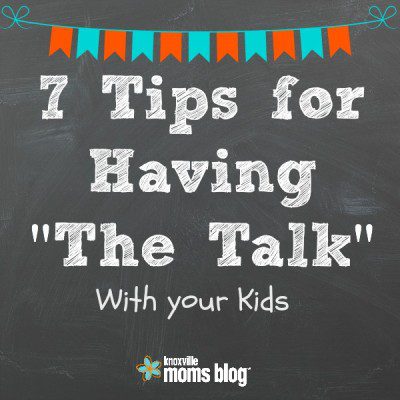Many parents avoid “the talk” because they are uncomfortable, or they don’t really know how to bring the subject up. Some think that saying “don’t do it until you are married” will suffice. The truth is, 71% of teens have had sex by the time they are 19 years old {source}. Obviously, I would rather my kids wait as long as possible before engaging in sexual activity. However, I feel like it is my responsibility to make sure that my kids are equipped with the knowledge they need to make healthy and informed decisions regarding their body and sexuality. I taught sex ed in East Tennessee for over 5 years – mostly to teens (ages 12-17). It was shocking how little most of them knew about their bodies. They would trust dangerous myths that their friends would tell them. Unfortunately, many of them did not have open communication with their parents, and thus they didn’t know who to turn to when they had questions. With quality sex ed virtually non-existent in many public schools, it is up to parents to fill that gap! I have outlined a few tips to hopefully help relieve some of the fear and anxiety!
1. Start the conversation early
The topics of your conversations will vary depending on the age of your child. A 5 year old may be questioning the difference between boys and girls. This is a great opportunity to discuss basic anatomy. Always use correct terms for anatomy. When you come up with nicknames, it may convey the idea that those parts of the body are “shameful” and should not be talked about. Never answer a child’s questions with shock (“We don’t talk about that!” or “You shouldn’t ask those questions!”). That will only spike an unhealthy curiosity and will make them feel like their questions were “bad.” When kids start feeling judged and ashamed, they stop trying to talk to you.
2. Be age appropriate but truthful
Even when your children are young, avoid answering questions with outlandish answers. Telling them a stork brings babies is not helpful. To gauge what your child already knows (or thinks they know) begin by saying something like “why don’t you tell me what you already know or think about where babies come from.”
3. Think of it more as an ongoing conversation rather than a single “talk”
Try to avoid a one-time only sit down “talk.” Instead, use every-day scenarios as opportunities to spark conversations with your child. Always be on the lookout for teachable moments (situations that arise on TV, issues that their friends are dealing with, etc.). Think of it more as a compilation of a lot of “little” discussions. Avoid probing or prying too much – this will just push your kids away.
4. Use “I” statements and reflective listening
Listen carefully to your kids. Repeat back a summary of what they say to you to ensure you have a complete understanding of what they are trying to say or ask. Use phrases such as, “I understand how you are feeling” to help convey your own values, beliefs, and thoughts about sex and sexuality. When you are discussing your values and beliefs, make sure you are not being accusatory.
5. Don’t be afraid to say “I don’t know”
Be honest if your child asks you something that you are unsure about. Don’t be embarrassed to look an answer up – just make sure you are using factual sources!
6. Remember it’s not just about sex
These conversations are a great time to include discussions regarding faith, values, communication, relationships, health, and safety.
7. Find helpful reading material
Books and online articles can be really helpful. Parents can use them to brush up on some knowledge they may not be aware of, and they can be used as great conversation starters. Books about puberty and other subjects can be great for supplementing your conversations. However, don’t rely on books to do all the work. Read the book together and encourage questions.
Talking with your kids about sex can be intimidating, scary, and embarrassing. Don’t be afraid to be vulnerable with your kids and let them know that you are uncomfortable but that you are trying to make sure they know that they can talk to you about anything.
For some more detailed information on answering questions related to sex and sexuality see this comprehensive and informative article from Parenting.com.
Have you faced “the talk” with your kids? Do you have any tips for parents?
We would love to hear them!





















These are all really good tips. I would just add this: you don’t have to tell them more than what would suffice to answer their questions. My mom gave me ALL the details…because no one had given her ANY. As my siblings came along, she learned more restraint in answering questions and what was necessary to satisfy the questions and curiosity without saying more than necessary.
For example, when our oldest asked about our second. I told him a “part of mom and a part of dad came together and made the baby.” He was totally satisfied with that, and we didn’t have to get into sperm and eggs or even sex itself…yet. 😉
Meg– you are SO right! I think it scares parents off thinking that they have to give a full on anatomy lesson to their 5 year old so they just panic and come up with some outlandish answer! Thank you for sharing!
It sounds crazy, but we watched “Look who’s talking” the other day and the opening scene of the sperm finding the egg was a perfect teaching tool for my 5 year old. We didn’t get into all the details of sex, but we’re able to explain the mechanics of conception in a fun way.
Heather– I love it!